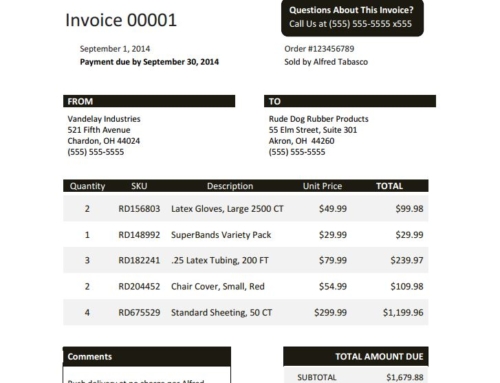There are many different benefits too be realized from using invoice software, such as faster payment, removing payment barriers, saving time and automating communications. However, these benefits are only available if the right invoice software is chosen to fit your business needs and complements your other business software. All invoice software should have a few basic features that will enable you to reap the benefits listed above.
Below, we explain the 7 different features that you should expect during invoice software selection.
USER TYPES
Make sure to select an invoice software system that allows for multiple users to send and manage invoices. A/R is more than an accounting function, so you may also want to consider users who are not as obvious as a credit manager or collector and what those different users would need from the system. For example, your sales team can help with collections if they have access to the system or a report to see who has outstanding invoices, credit limits, and terms as they talk with customers. A few other roles that may require or benefit from access to the software might be:
- CEO/ President
- CFO/ Controller
- Credit Manager
- Collections Representative
- Sales Representatives
- Customers (a customer portal for managing their own invoices)
- Customer Service
INTEGRATION WITH OTHER KEY BUSINESS SYSTEMS
They key to a successful debt collection strategy is to keep all of your information in one central location. Be sure your software can integrate with your ERP/accounting system, CRM system, email, and other critical applications. Otherwise you will be stuck managing data in separate locations, an easy way to make mistakes and waste a lot of valuable time.
AUTOMATION
If you are like most companies, the point of using invoice software is to become more efficient and more effective in your processes, which means you need automation. The right software system will help you automate your most time consuming daily activities such as:
- Prioritized lists
- Payment reminders and late invoice notifications
- Follow up schedules
- Creation and assignment of actions
- Closure of issues when the customer payment is received
- Escalation of credit issues to managers
- Tracking of broken promises.
INVOICE DETAILS
What type of information do you want to have on your invoices? Make sure the system you choose allows you to include all of the information you and your customer need for payment. You may also want the freedom to create your own invoice templates and save them; this is especially helpful if you have customers who require their invoices to be in a certain format before they can process payment.
ALERTS AND NOTIFICATIONS
Another purpose of invoice software is to give you peace of mind that nothing is slipping through the cracks. A system that will alert you to important activities the moment they happen, like an invoice going beyond term, a broken promise, or missing information on an invoice, to ensure these are always followed up on.
REPORTING
If you have goals for your credit and collections department you will need to measure them, so a key performance indicator (KPI) dashboard is essential in your software. A system with business intelligence features can provide collectors, credit managers, sales reps, executives, and others with a snap shot of the current A/R situation as well as more detailed reports either by logging into the software or by setting up weekly/monthly email reports.
DEPLOYMENT
Make sure you evaluate your options when it comes to deployment; do you want to operate the software on premise or on the cloud? Consider whether you or other users, such as executives or sales reps who are often on the move, would need to access the software on the road. If that’s the case, a web-based system may be more appealing to you than a system that can only be installed and accesses on premise.




